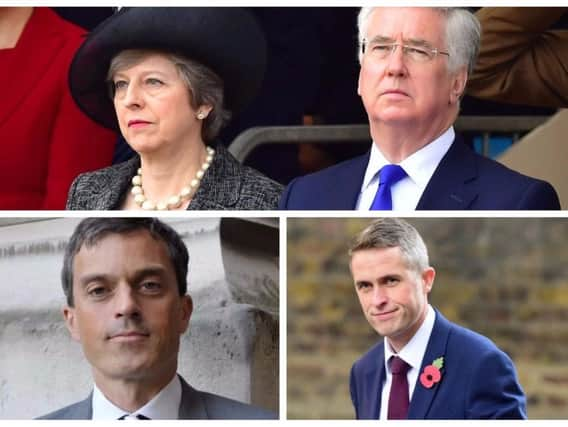Dark arts of the party enforcers now in spotlight as Yorkshireman takes on Chief Whip role


Having served as Deputy Chief Whip since June, Smith was the natural choice to succeed Gavin Williamson, but he has a much more relaxed style than his predecessor.
Famously, Williamson kept a tarantula in his office, and came across as a menacing character – one MP claiming that he made Francis Urquhart, the lead character in House of Cards, seem like Eddie the Eagle.
Advertisement
Hide AdAdvertisement
Hide AdBut is this caricature of the Chief Whip as a Machiavellian, scheming character really accurate? Part of the reason why the whips retain their image as experts in the dark arts is that very few postholders have ever revealed what they really do in their day jobs.
The only person of note who has published an account of their time in office is Tim Renton, who served under John Major in the early 1990s. As a result, he is no longer invited to gatherings of ex-Chief Whips because he had the temerity to break their Trappist-style vow of silence.
Recent revelations of a ‘dodgy dossier’ containing the peccadilloes and indiscretions of Conservative MPs may have created the impression that the central role of the Chief Whip is to keep a record of such matters in order to maintain loyalty. Jeremy Paxman once revealed the existence of a so-called
‘Black Book’ locked in a safe in the Tory Chief Whip’s office, which would occasionally be brought out to remind MPs of their continued loyalty to the Government.
Advertisement
Hide AdAdvertisement
Hide AdIn truth, records are kept of such things in order for the whips to help in the pastoral care of MPs. Whips play the role of social workers, inducting new MPs, as Smith did very effectively with the new intake of Conservative MPs following the June election. Now that he is Chief Whip, top of his list of priorities will be restoring MPs’ morale, which, as a result of the recent sexual revelations, has plummeted to its lowest level since the MPs’ expenses scandal of 2009.
However, in more normal times, the three main roles of a Chief Whip are management, communication and persuasion.
It will be of little surprise to readers that most MPs do not have a clue what they are voting for, so the first basic role of the Chief Whip is an organisational one: ensuring that they know which side to vote on in the House of Commons division lobbies.
The weekly whip is announced, conveniently telling MPs when they need to vote. In recent times, the Conservative whips’ office has been criticised for failing to organise their MPs properly, as during the coalition between 2010 and 2015, when the Government lost a vote over military intervention in Syria partly through poor organisation.
Advertisement
Hide AdAdvertisement
Hide AdA good Chief Whip is also a strong communicator, not only transmitting the views of the leadership down to the troops, but also communicating the concerns of the troops back up to the Prime Minister.
When they only engage in a one-way transmission from the leadership downwards, they are often criticised, as was the case with Hilary Armstrong, Tony Blair’s chief whip from 2001 to 2006.
But the most important role is persuasion, which is a world away from the public image. Very rarely are threats or physical force used. Rather, as one former whip put it, ‘conversation, not coercion’ is the key. In the run-up to contentious votes, the chief whip’s team will identify potential rebels and then use various tactics to bring them back into line.
The more gullible MPs may be enticed by a change of office or a free trip overseas. But more often than not, MPs just want someone to listen to them. Relatively minor concessions are offered in order to persuade MPs to stay loyal to the Government. Occasionally, the most stubborn MPs can be brought round by having an audience with a Minister, or even the Prime Minister.
Advertisement
Hide AdAdvertisement
Hide AdJulian Smith faces an especially difficult task in terms of persuading pro-Remain Conservative MPs to vote with the Government over the Great Repeal Bill currently making its way through the House of Commons.
While it will help that Smith voted Remain in the EU referendum last June, he still faces difficult private chats with intransigent pro-EU rebels like Dominic Grieve, Anna Soubry and Kenneth Clarke.
Perhaps he will have to resort to secret co-operation with the small number of Labour rebels like Dennis Skinner and Frank Field, who want to leave the EU at all costs. If Smith does, it won’t be last time that a Chief Whip has had to use the dark arts to win Parliamentary votes. It seems that the life of a Chief Whip will remain forever in the shadows.
Mark Stuart is a political academic from York who has written biographies of John Smith and Douglas Hurd.